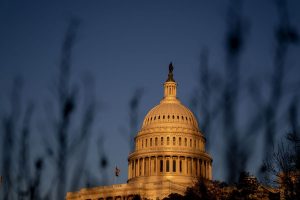Why Jan. 6 Is Key Date for Trump’s Election Gripes

The voters have spoken. So have theelectors who, under America’s unique system, have the official job of choosing the next president. The U.S. Congress still has a role to play, one that’s usually mostly ceremonial, but this time around could mark one last attempt by loyalists to President Donald Trump to overturn the election of President-elect Joe Biden.
1. What is Congress’s role?
On Wednesday, the Senate and House meet jointly to open and count certificates of electoral votes from the 50 states and the District of Columbia, in alphabetical order. Any member may object to the results from any individual state. The process is spelled outin great detail in the U.S. legal code, right down to the Jan. 6 date and the hour (1 p.m.) at which the joint session begins. The candidate who reaches 270 electoral votes is the winner. Vice President Mike Pence, whose duties include being the president of the Senate, will lead the session.
2. What might happen this time?
Numerous House Republicans have said they will object to the official electoral results from some or all of six states won by Biden — Arizona, Georgia, Michigan, Nevada, Pennsylvania and Wisconsin. As many as a dozen Republican senators say they, too, will raise objections to one or more state results.
3. What happens then?
If at least one representative and one senator object to a state’s result, the joint session immediately recesses before the next state is called. The House and Senate meet separately to debate the objection for up to two hours before voting on whether to count or discard the electoral votes in question. Only if the objection is approved by both houses would votes be excluded. With a Democratic majority in the House, and several Republican senators on record opposing Trump’s attempts to overturn Biden’s win, any objection would be highly unlikely to succeed in getting electoral votes thrown out. But if separate two-hour debates are required for multiple states, the process could become a drawn-out, acrimonious affair.
4. What is Pence’s role?
Thetraditional view is that Pence, as the presiding officer, has a mostly ministerial role in these proceedings — preserving order, hearing objections, announcing results. That means he may find himself inthe awkward position of having to gavel down objections raised by supporters who would like nothing more than to keep him in office as vice president. A Republican representative from Texas, Louie Gohmert,tried to get a federal court to rule that Pence has the power to order that Democratic electors not be counted, but judgesrejected his effort. That didn’t stop Trump, in a Jan. 5 tweet, from alleging that Pence could do just that.
@realDonaldTrump
The Vice President has the power to reject fraudulently chosen electors.5:06 PM · Jan 5, 2021
356K
170.1K people are Tweeting about this
